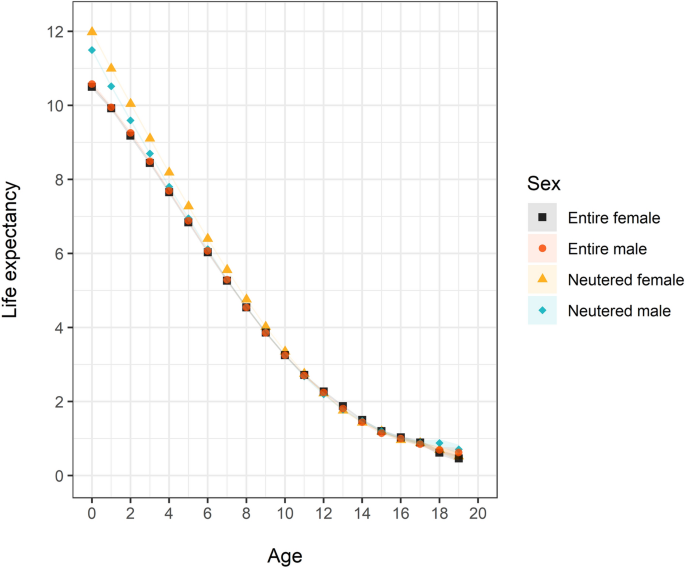The average lifespan of a dog is influenced by their size, breed, lifestyle, and quality of care, with smaller dogs typically living longer than larger breeds. In addition, a healthier diet and regular exercise contribute to a longer lifespan for dogs.
On the other hand, factors such as overeating and lack of exercise can decrease a dog’s lifespan. Dogs who consume less sugar, fat, and sodium, and have a well-balanced diet also tend to live longer. It is important for pet parents to understand the factors that affect their dog’s lifespan and take necessary measures to ensure their dog lives a long and healthy life.

Credit: www.nature.com
Factors That Affect Your Dog’s Lifespan
Just like humans, dogs’ lifespans can vary depending on various factors. Understanding these factors can help you make informed decisions regarding the care and well-being of your furry friend. Here are five major factors that can affect your dog’s lifespan:
The size of your dog plays a significant role in determining their lifespan. Smaller breeds, such as chihuahuas, tend to live longer than larger breeds like Great Danes. Generally, smaller dogs have fewer health problems and are less prone to certain diseases.
The breed of your dog can have a substantial impact on their lifespan. Some breeds are genetically predisposed to certain health conditions, which can shorten their lifespan. For example, brachycephalic breeds like Bulldogs and Pugs can experience respiratory issues and have shorter lifespans compared to other breeds.
A well-balanced diet and proper nutrition are crucial for your dog’s overall health and longevity. Dogs who enjoy a healthier diet, consisting of high-quality proteins, fats, carbohydrates, vitamins, and minerals, tend to live longer lives. Avoiding excess sugar, fat, and sodium is also important in maintaining their health and longevity.
Regular exercise and physical activity are essential for dogs to maintain a healthy weight and overall well-being. Dogs who receive enough exercise tend to be healthier and live longer lives. Adequate exercise helps prevent obesity, which can lead to a range of health problems and decrease their lifespan.
The quality of care and the living conditions you provide for your dog can significantly impact their lifespan. Regular vet checkups, vaccinations, and preventive care are essential in keeping your dog healthy and catching any potential health issues early on. Providing a safe and comfortable environment along with mental stimulation also contribute to their overall well-being and longevity.
Size Of Dog
The size of your dog is one of the major factors that can affect its lifespan. Generally, smaller breeds tend to live longer compared to larger breeds. Other factors like breed, lifestyle, and quality of care also play a significant role in determining the life expectancy of your furry friend.
Smaller Dogs
Smaller dogs, such as chihuahuas, tend to have a longer lifespan compared to larger breeds like Great Danes. This can be attributed to several factors. Firstly, smaller dogs generally have slower metabolic rates, which means that they age at a slower pace. Additionally, smaller breeds often experience fewer health issues and have a lower risk of developing chronic diseases. Their smaller size also puts less stress on their joints and organs, leading to improved overall health and longevity.
Larger Dogs
On the other hand, larger dogs have a shorter lifespan compared to their smaller counterparts. This can be partly attributed to their rapid growth and development during puppyhood. The increased growth rate puts more strain on their bodies and can lead to developmental issues. Additionally, larger dogs are more prone to certain health conditions such as hip dysplasia and heart disease, which can further reduce their lifespan. However, with proper care and a healthy lifestyle, the lifespan of larger dogs can be extended.
Whether you have a small or large dog, it is important to provide them with a balanced diet, regular exercise, and regular veterinary check-ups to ensure their overall health and longevity. By understanding the factors that affect your dog’s lifespan, you can make informed decisions to help them live their best life.
Breed Of Dog
The lifespan of a dog is influenced by various factors, including size, breed, lifestyle, and quality of care. Smaller dogs generally live longer than larger breeds, and dogs who have a healthier diet and regular exercise tend to have longer lifespans.
Different Lifespans By Breed
The breed of dog plays a significant role in determining their lifespan. Different breeds have different average lifespans, with some living longer than others. This can be attributed to various factors such as genetics, size, and overall health.Genetic Factors
Genetics is a major determinant of a dog’s lifespan. Certain breeds are predisposed to certain health conditions that can affect their lifespan. For example, large breeds like Great Danes are more prone to joint problems and have shorter lifespans compared to smaller breeds like Chihuahuas. It is important to consider the breed’s genetic predispositions before bringing a dog into your family.Diet
A well-balanced diet is crucial for a dog’s longevity. A nutritious diet consisting of proteins, fats, carbohydrates, vitamins, and minerals can help prevent obesity and other health issues. Avoiding excess sugar, fat, and sodium is also important. Additionally, providing fresh water daily is essential for a dog’s survival.Exercise
Regular exercise is beneficial for both physical and mental health, which can contribute to a longer lifespan. Dogs that engage in regular physical activity tend to have stronger muscles, healthier joints, and improved cardiovascular health. Exercise also helps prevent obesity, which is a common factor that decreases a dog’s lifespan.Veterinary Care
Regular vet checkups are crucial for maintaining a dog’s health and detecting any potential health issues early on. Vaccinations, preventive treatments, and routine examinations can significantly impact a dog’s lifespan. It is important to follow your veterinarian’s recommendations for vaccinations and preventive care to ensure your dog’s well-being.Conclusion
In conclusion, the breed of dog plays a crucial role in determining their lifespan. Genetic factors, diet, exercise, and veterinary care are all interconnected and contribute to a dog’s overall health and longevity. By understanding these factors and providing the necessary care, you can help ensure that your dog lives a long and healthy life.
Credit: www.princeton.edu
Diet And Nutrition
A balanced and nutritious diet is one of the major factors that greatly impact a dog’s lifespan. The food that your furry friend consumes plays a crucial role in determining their overall health and longevity. By providing them with the right nutrients, you can ensure that they live a long and healthy life.
Impact Of Diet On Lifespan
The diet that you feed your dog directly affects their lifespan. A poor diet lacking in essential nutrients can lead to various health issues and decrease their overall life expectancy. On the other hand, a well-balanced and nutritious diet can help prevent diseases, improve immune function, and promote overall well-being.
Balanced And Nutritious Diet
Feeding your dog a balanced and nutritious diet is vital for their longevity. A well-balanced diet should include proteins, fats, carbohydrates, vitamins, and minerals in appropriate proportions. Proteins are essential for muscle growth and repair, while fats provide energy and support healthy skin and coat. Carbohydrates provide a source of energy, while vitamins and minerals play vital roles in various bodily functions.
It is important to choose high-quality dog food that meets your dog’s specific nutritional needs. Consult with your veterinarian to determine the best diet plan for your dog based on their breed, age, size, and any specific health conditions they may have.
Additionally, it is crucial to provide fresh and clean water for your dog at all times. Water is essential for their overall well-being and helps maintain proper hydration.
By ensuring your dog receives a balanced and nutritious diet, you can greatly contribute to their overall health and increase their lifespan. Remember, proper nutrition is key to a long and happy life for your beloved furry companion.
Exercise And Physical Activity
Regular exercise and physical activity play a vital role in determining your dog’s lifespan. Just like humans, dogs require regular physical activity to stay healthy and extend their life expectancy. Exercise helps keep their bodies in good shape, strengthens their muscles, and improves their overall well-being. In this section, we will explore the importance of exercise and how it affects your dog’s lifespan.
Importance Of Exercise
Exercise is not just about keeping your dog physically active; it also has a significant impact on their mental health. Engaging in regular exercise helps reduce stress and anxiety in dogs, keeping them mentally stimulated and happy. Dogs that lack exercise are more prone to behavioral issues such as excessive barking, destructive chewing, and even aggression.
Moreover, exercise is essential for maintaining a healthy weight. Obesity is a common problem among dogs and can lead to various health issues like diabetes, heart disease, and joint problems. By incorporating regular exercise into your dog’s routine, you can help them maintain a healthy weight and prevent these ailments.
Regular Physical Activity
The type and intensity of exercise will vary depending on your dog’s breed, age, and overall health. However, incorporating regular physical activity into their daily routine is crucial. Aim for at least 30 minutes to an hour of exercise per day, which should include a combination of activities like walking, running, playing fetch, and interactive games.
Engaging your dog in different types of exercise not only improves their cardiovascular health but also enhances their joint flexibility and muscle strength. It also provides mental stimulation, as dogs love exploring new environments, scents, and engaging in interactive play.
To ensure your dog gets the exercise they need, set aside dedicated time for physical activity. Create a regular exercise schedule and stick to it. If you have a busy lifestyle, consider hiring a dog walker or enlisting the help of a family member or friend to take your dog out for walks or playtime.
In addition to regular exercise, provide your dog with opportunities for mental stimulation. Puzzle toys, treat-dispensing toys, and obedience training sessions can help keep their minds active and engaged, contributing to their overall well-being and lifespan.
Remember, every dog is unique, and it’s important to consult with your veterinarian to determine the appropriate exercise routine for your furry friend. With regular physical activity and mental stimulation, you can significantly enhance your dog’s lifespan and ensure they live a healthy and fulfilling life.

Credit: www.pinterest.com
Quality Of Care
The quality of care you provide for your dog plays a significant role in determining their lifespan. Proper healthcare, regular vet checkups, socialization, mental stimulation, and prevention of obesity are all essential factors that contribute to your dog’s overall well-being and longevity.
Healthcare And Vet Checkups
Regular healthcare and vet checkups are crucial for maintaining your dog’s health and detecting any potential issues early on. Just like humans, dogs need routine medical care to ensure they are in optimal condition.
Socialization And Mental Stimulation
Socialization and mental stimulation are key aspects of a dog’s life that can greatly impact their lifespan. Dogs are social animals, and providing them with opportunities to interact with other dogs and humans can improve their overall well-being.
Prevention Of Obesity
Preventing obesity in your dog is essential for their longevity. Obesity can lead to various health problems such as diabetes, joint issues, and heart disease. Ensuring proper exercise and a balanced diet are important for maintaining a healthy weight for your furry friend.
Frequently Asked Questions Of 5 Major Factors That Affect Your Dog’s Lifespan
What Affects The Lifespan Of A Dog?
The lifespan of a dog is influenced by factors such as size, breed, lifestyle, and quality of care. Smaller dogs like chihuahuas tend to live longer than larger breeds. Dogs who have a healthier diet and get more exercise often live longer.
Overeating and lack of exercise can decrease a dog’s lifespan.
What Decreases Dog Lifespan?
Allowing your dog to overeat and not getting enough exercise can decrease their lifespan. Obesity and poor diet can lead to health issues. Dogs who eat a balanced diet with less sugar, fat, and sodium tend to live longer. Regular exercise and a healthy lifestyle are also important factors.
What Makes Dogs Live The Longest?
Dogs who eat a healthy diet, exercise regularly, and avoid excess sugar, fat, and sodium tend to live longer. Factors such as size, breed, and quality of care also affect a dog’s lifespan.
Can Some Dogs Live 20 Years?
The average life expectancy of dogs depends on factors like size, breed, lifestyle, and quality of care. Smaller dogs typically live longer than larger breeds. A healthier diet and more exercise also contribute to a longer lifespan. Avoiding excess sugar, fat, and sodium can help dogs live longer.
Conclusion
The lifespan of your dog is influenced by several significant factors. Breed, size, diet, exercise, and overall quality of care all play a crucial role in determining how long your furry companion will live. Smaller breeds typically have longer lifespans compared to larger ones, and providing a healthy diet and regular exercise can lead to a longer, healthier life for your dog.
By understanding and addressing these factors, you can positively influence your dog’s lifespan and enjoy many happy years together.







